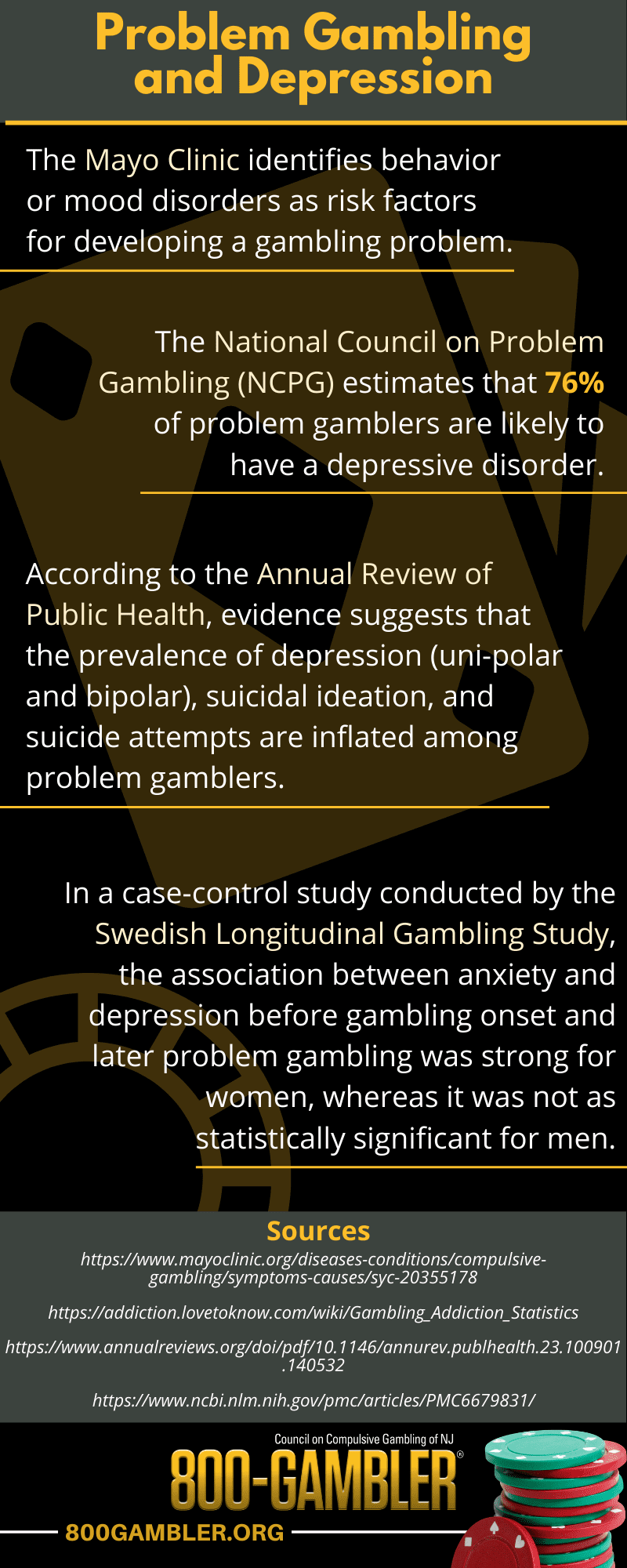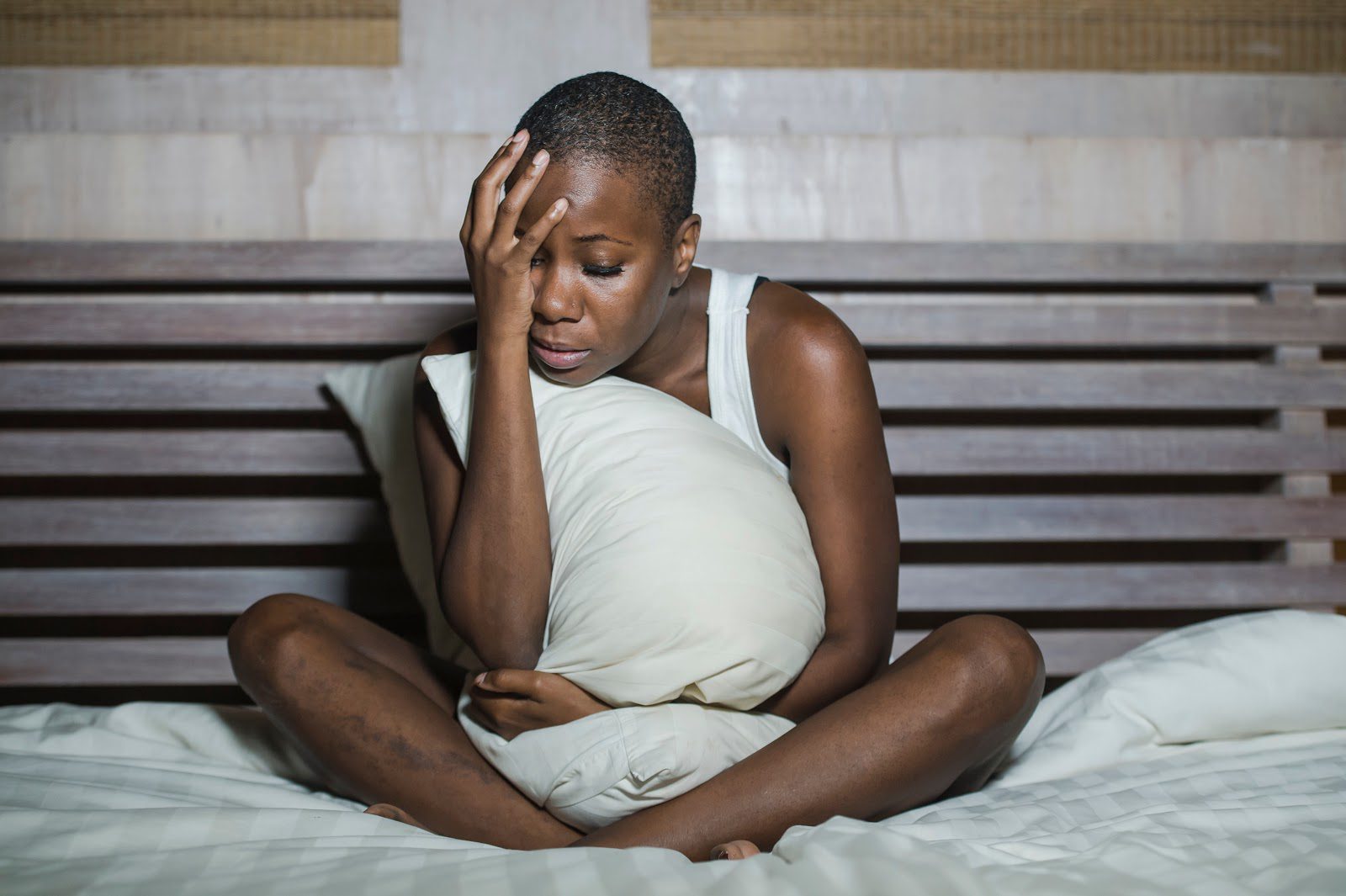In the past, 800-GAMBLER has discussed various topics ranging from the importance of mental health during COVID-19 to the link between problem gamblers and suicide. Since the month of October is formally recognized as Depression Awareness Month, we thought it would be appropriate to focus on one of the most common mood disorders in the U.S.
As described by the World Health Organization (WHO), depression affects individuals of all ages and from all walks of life. It causes mental anguish, impacting people’s ability to carry out even the simplest everyday tasks, with potentially devastating consequences for relationships with friends and family and the ability to earn a living. If you or someone you know has faced a gambling problem, some of the descriptors may sound familiar.
It’s essential to consider both depression and problem gambling when seeking treatment, as each can intensify symptoms of the other. If you are feeling depressed, you’ll be looking for a mood boost — and the thought of winning big may seem like an easy solution. Rest assured that you’re not alone:

What Is Depression?
To truly explore the relationship between problem gambling and depression, one must understand what depression is. Depression (also known as major depressive disorder) is a serious medical illness characterized by intense feelings of sadness and a lack of interest in important activities or ones you enjoy. Depression affects almost 1 in 15 adults yearly, and it’s not something you can simply “snap out of.” Depression affects how you think, feel, and behave and is relentless, so it’s very important to take depression seriously.
Signs of Depression
Many associate the feeling of anger or being upset with depression, but separating the two is an important distinction. Being angry at a failed goal isn’t a sign of problem gambling or depression. The term is often used loosely, but it’s important to identify the signs of this mental health disorder so individuals truly suffering from depression as a result of problem gambling activity or other issues can get the help they need. An individual may have depression if they experience one or more of the following:
- Loss of interest or pleasure in activities
- Increased irritability, restlessness, or social isolation
- Feelings of worthlessness and self-loathing
- Compromised sleep or appetite
- Weight fluctuations
- Inability to control emotions and actions
- Hopeless outlook on life
Much like problem gambling, depression isn’t always apparent. After all, we undergo some of these emotions or “funks” from time to time. However, when these negative feelings are consistently piled high — detrimentally so — it may be time to talk to a professional.
As you can imagine, developing a gambling problem can easily come from many of these signs. Loss of interest in activities can lead individuals to manufacture emotion from risky behaviors. The inability to control emotions or actions can foster other conditions, such as problem gambling. Depression is a serious mental health condition, so be sure to get someone the help they need to combat this illness.
Signs of a Gambling Problem
Many of the signs of a gambling problem relate to the symptoms of depression. Because they can go hand in hand yet represent two different phenomena, it’s important to evaluate both signs, how similar and how different they may be. If you’re having trouble with gambling, here are some signs to note:
- Hiding your gambling habits or feeling the need to be secretive about it
- Inability to stop gambling when you can’t afford it
- Family and friends notice behavioral changes and have brought up concerns about your behavior
- Feelings of worthlessness after not getting your intended result
- Restlessness or other symptoms when attempting to pause your gambling
- Chasing your losses
- Risking important relationships to gamble
- Lack of sleep, appetite, or proper nutritional intake
As you can tell, gambling and depression can go hand in hand, with many of the signs potentially representing both conditions. If you believe you might have a gambling problem, try answering these 20 questions of gamblers anonymous to help better understand your situation.
Are There Any Risk Factors That Link Gambling and Depression?
Simply gambling isn’t guaranteed to lead to problem gambling or depression, but there are a few risk factors to keep in mind that link gambling and depression. One of the biggest signs is any previous mental health issues. People with problems gambling often have other mental health, personality, or eating disorders or are diagnosed with depression or anxiety. Age is also a complicating issue, as gambling is more common in the teenage years, which increases the risk of depression. Additionally, certain personality traits and influences from friends and families can link gambling and depression. Remember, if you believe someone you know to be a problem gambler, get help by calling 1-800-GAMBLER today.
Problem Gambling and Depression: A Detrimental Symbiosis
Perhaps you understand that a depressive episode drove you to gamble in the first place — or make a regrettable return. Maybe normal gambling behavior led to problem behaviors that eventually drove you into a state of complete hopelessness. Alternatively, the jury could be out — when it comes to an unrelenting whirlwind of problem gambling and depression, you may feel like you’re in a “chicken or the egg” scenario. However, that doesn’t mean you’re stuck forever.
October may be Depression Awareness Month, but at 800-GAMBLER, we understand that the effects on your day-to-day life aren’t exclusive to 31 days. If you or an individual close to you has a gambling problem, reach out to our free confidential helpline today at 1-800-GAMBLER.
Sources:



